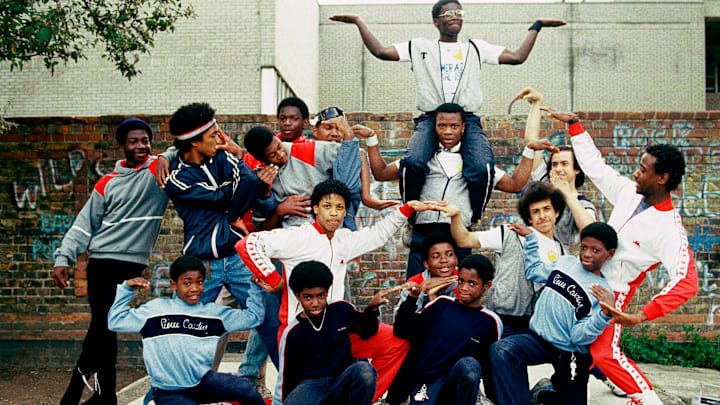7. The Bridge by MC Shan and Marley Marl/ South Bronx by Boogie Down Productions (1986)
Much has been said regarding the Bridge Wars that emanated through the boroughs of New York City as a result of the initial clash between the Queensbridge-based Juice Crew, specifically MC Shan, and Boogie Down Productions, named for their home base in the Boogie Down Bronx.
Despite the many diss records various artists threw in the mix, I find it interesting that if you focus solely on the initial dispute between Shan and BDP, at least on record, at the core was a desire on both sides to celebrate their neighborhood's history. They each were intent on indulging in nostalgia for the hip-hop scenes of their past.
In Time is Illmatic (2014), Marley Marl explains that "The Bridge" existed a while before it was put on record, having been intended as intermission music for Queensbridge Day, but growing extremely popular as the tape spread through the neighborhood.
"The Bridge" is essentially a history lesson, with Shan detailing the various pioneers of the Queensbridge hip-hop scene, such as DJ Gas or Larry Larr (not the Philadelphia rapper), who is seemingly Marley Marl's older brother.
Larry Larr was also a member of the Queensbridge-based High Fidelity Crew, I believe, along with most, if not all, the other names Shan lists alongside him, such as Cousin Bruce. One of the High Fidelity Crew's members was the older brother of Craig G as well, according to his 2013 interview with Robbie Ettelson for Unkut.
Basically, "The Bridge" traces the Queensbridge lineage from the park jams of the High Fidelity Crew all the way to when Marley Marl and Dimples D. made "Sucker D.J.'s (I Will Survive)" in 1983, a response record to Run-DMC's game-changing "Sucker M.C.'s. (Krush-Groove 1)."
Shan also uses the occasion to list off the members of the Juice Crew at that time in the mid '80s, beginning with Roxanne Shante, and following with himself and Craig G., the latter being the newest member. To keep it short, "The Bridge" is a classic song and a classic example of nostalgic admiration within hip-hop.
When Boogie Down Productions responded to Shan's record with "South Bronx," claiming Shan said Queensbridge was the birthplace of hip-hop rather than the South Bronx, they also gave a story of hip-hop history.
"South Bronx" followed the same basic structure of "The Bridge," which was the norm for response records of the time, such as 1985's "The Show Stoppa (Is Stupid Fresh)" by Super Nature (later renamed to Salt 'N' Pepa) and Hurby Luv Bug, who were responding to "The Show" by Doug E. Fresh and The Get Fresh Crew, then featuring MC Ricky D (later named Slick Rick).
Response records were not necessarily diss records, at least not harsh ones, more so acting as a way for artists to use a popular record to gain traction. While Boogie Down Productions was certainly trying to get on, "South Bronx" was also very clearly dissing Queensbridge and Shan, in part due to their being brushed off by Mr. Magic after trying to give him their demo.
Despite KRS-One not being originally from the Bronx, you cannot tell while listening to "South Bronx." He mirrors Shan's style and lyrical structure perfectly, listing off the dense history of the Bronx hip-hop scene.
He runs through Kool Herc, Coke La Rock, Grandmaster Flash, Afrika Bambaataa, Afrika Islam, Kool DJ Red Alert, and DJ Chuck Chillout, not to mention the various neighborhoods where these figures lived and the crews they were with, such as the Nine Lives or Rock Steady Crew.
While the beef definitely escalated past "South Bronx," I think it is important to remember that cherishing hip-hop, and therefore cherishing one's community, was the main source of content in the beginning, in large part because that was the purpose of the record that became the musical source of the beef.
Even with the context being a battle, the content was still showing the community in a positive light and celebrating, which I believe is what hip-hop should be focused on as it turns 52.
